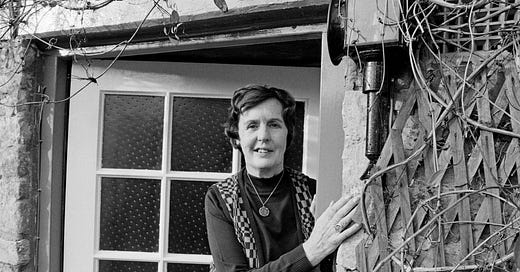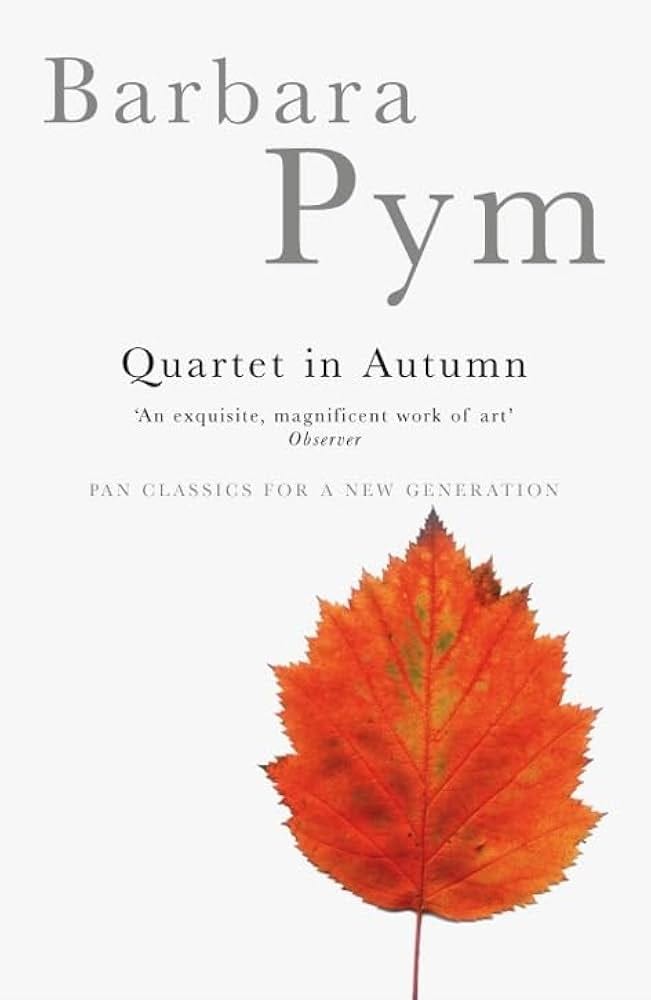“‘You’d better say they’re from all of us, the flowers.’”
If, due to ennui or to having lost the remote between the sofa cushions, you happen to watch a movie’s credits long past the accustomed point, you eventually come to the roles that no one bothered to name: Office Worker #2, Drive-through Guy, Woman in Airport. Barbara Pym writes novels that are entirely about these anonymous pieces of human scenery. She speaks for the overlooked, the lonely, the quietly retired. If you were to deliver an elevator pitch for one of her novels (So these four unmarried sixty-somethings work together in an office, and they don’t really like each other, but they also don’t really dislike each other), your pitch-ee would have his headphones back in before you’d taken a breath.
And the surprise isn’t that her books are worthwhile. I wouldn’t be reading them (let alone bothering you about them) if they weren’t. The surprise is that they achieve their worthiness not by attuning you to the secret griefs and ecstasies of the unseen, the arias that burst forth unexpressed behind even the most prim and placid of faces. They do it by demonstrating the bracing fact that many lives (all lives, much of the time) are simply quiet, even to the people living them. You enter her books the way you might settle into the guest chair in an invalid’s one-room apartment: oh, yes, right, the hum of the refrigerator; the long wait for the excitement of the mail; the seasons that don’t make it into photo albums.
Which isn’t to say that her books are dull, thank God. Quartet in Autumn — my favorite, published in 1977 — is in its modest way hilarious, even gripping. The four lonely near-retirees at its center take very little action in the course of the book (when one of them does have the gall to express interest in traveling to Greece, the others are quick to remind him of the much more conveniently situated wonders available at the British Museum). But they live, in a way that few fictional characters do. They have the stubborn vitality and individuality of the spider plant (“...many little offshoots were now hanging down until they dangled over the radiator,“) that one of them, Letty, leaves behind in the office when she retires. If human life is worth celebrating (and Pym, whose books are shot through with an unshowy sort of Christianity, seems to believe that it is) then we had better face up to the actual awkward lunches and pointless fretting that so much of human life consists of.
And it’s in animating these unpromising stretches — life’s junk DNA — that Pym demonstrates her greatness. Late in the book, in what counts as a plot cataclysm, one of the characters ends up in the hospital. Her officemates — determined, as ever, to meet every circumstance without risk and without embarrassment — decide to send flowers.
“‘I’ll get some flowers and take them round — the hospital’s not far from where I live,’ said Edwin soothingly. ‘And I’ll get in touch with Letty.’
Norman fumbled in his trousers pocket and produced a fifty pence piece. ‘You’d better say they’re from all of us, the flowers. Here’s something towards it.’”
It’s Norman’s line — You’d better say they’re from all of us, the flowers — that delights me, and that seems to represent an actual if humble advance in the project of documenting the human experience. Say they’re from all of us. This is the room temperature tap water of human callousness. Norman’s not being monstrous; he is simply being a participant in the necessary and not-quite-heartfelt business of keeping civilization creakily in motion. Pym has a good ear for speech (how much better — how much more audible — the sentence is for ending with that superfluous the flowers). But her true gift is her ear for silence — the silence punctuating a conversation that isn’t, after all, expressing what anyone feels (Is she going to get out of the hospital? Are we going to be next?); the silence of the suddenly-vacant apartment; the silence of the graveyard.
We are, all of us (if we’re lucky!), going to someday be the recipient of hospital flowers, and it’s quite likely that at least one of those flowers’ senders will be worried not about our health but about why he hasn’t yet been Venmo’d for his share. This is ridiculous and depressing; it’s also a clear and somehow lovable demonstration of life’s tendency to grow mindlessly, blindly down toward the radiator. Thank goodness Pym was there to see it.





Barbara Pym is my all time favorite. I have read and reread all her novels. Crampton Hodnet is my favorite of all, and has made it's way into my vocabulary whenever something rather dodgy comes up--it's a little Crampton Hodnet.
I don’t like these posts, I love them. They are quirky, inquisitive, thoughtful, and humorous. Fabulous morning amuse bouche.